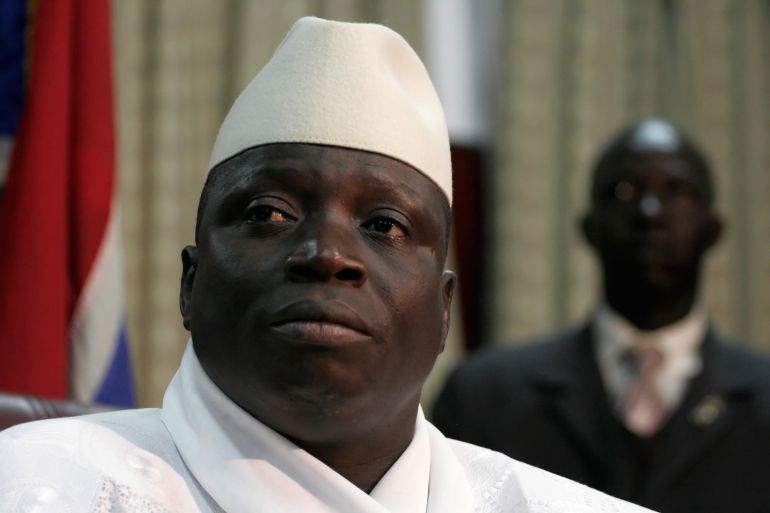The Gambia’s ex-ruler Jammeh ignores president’s campaign warning
In a controversial intervention, exiled Yahya Jammeh speaks remotely at public meeting of candidate he has endorsed, accusing his successor of ‘destroy[ing] the country’.

Yahya Jammeh, the exiled former leader of The Gambia, has ignored a warning by incumbent President Adama Barrow not to intervene in the country’s election campaign before polls early next month.
In a controversial move, Jammeh late on Thursday spoke remotely at a public meeting of Mama Kandeh, the presidential candidate he has endorsed in the December 4 election, in which a total of six contenders, including Barrow, are vying for the country’s top post.
Keep reading
list of 3 itemsThe Gambia’s democratic transition is facing a litmus test
Who are the men vying for the Gambian presidency?
Jammeh, whose 22-year rule was marked by extrajudicial killings, torture and forced disappearances, had refused to concede defeat to Barrow following the previous election in December 2016. After a six-week crisis that led to a military intervention by other West African states, he was forced to flee to Equatorial Guinea in early 2017.
Urging Gambians to back him and Kandeh, Jammeh alleged that Barrow and his allies had “rigged” the 2016 polls and accused his successor of having “destroyed the country in just four years”.
“I want to assure you that … if you vote for us, you are going to have all of what I’ve told you,” he said at the meeting.
“That is free education, free medical care for all Gambians … and Gambia will be developed to a point where it will be one of the most developed countries in the world.”
Earlier this week, Barrow had threatened Kandeh with legal action if he continued to play recordings of Jammeh in campaign events, although he did not say what law was being violated.
“Yahya Jammeh is in exile. He doesn’t have permission to take part in our politics,” local media quoted him as saying.
“If you call him, give him the chance to talk and cause problems here, I’m warning Mama Kandeh, since he is the party leader. We will give notice to the Independent Electoral Commission to warn him.”
Jammeh still has significant political support in The Gambia. His future role in the country, as well as the question of justice for crimes committed under his rule, are both central themes in the run-up to the election.
Witnesses have already given chilling evidence about state-sanctioned torture, death squads, rape and witch-hunts, often at the hands of the “Junglers” who acted as Jammeh’s death squads.
Jammeh seized power in The Gambia in 1994 as part of a bloodless military coup. He was then repeatedly re-elected in disputed circumstances until he was defeated by Barrow five years ago.
Barrow’s candidacy is controversial in its own right. He initially said he would only serve as a transitional leader for three years but later reversed course and decided to stand for re-election.
Earlier this year, his National People’s Party signed a controversial alliance with Jammeh’s party, the Alliance for Patriotic Reorientation and Construction (APRC), to drum up more votes – a move purportedly rejected by Jammeh.
Barrow’s critics have feared that the Truth, Reconciliation and Reparations Commission instituted to address human rights violations by his predecessor, and which has yet to release its findings despite concluding hearings, may only be a charade.